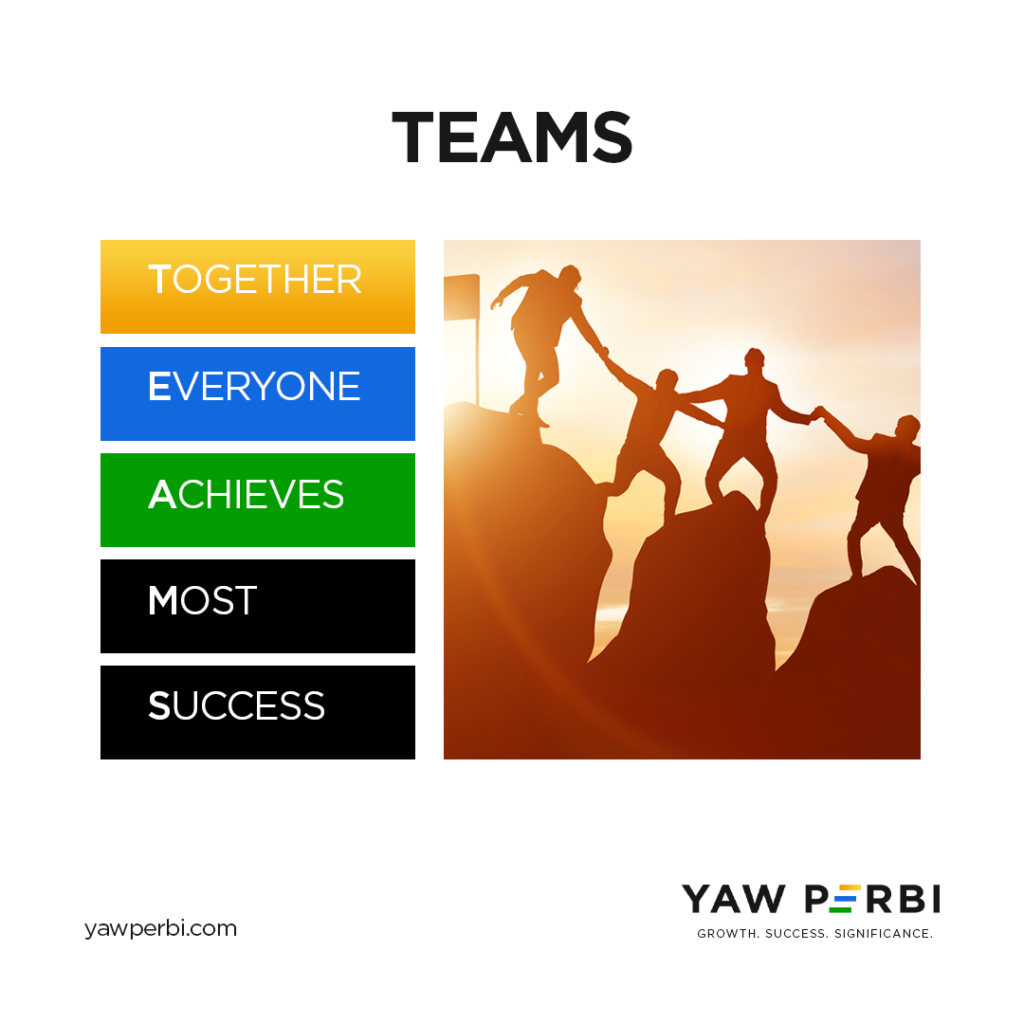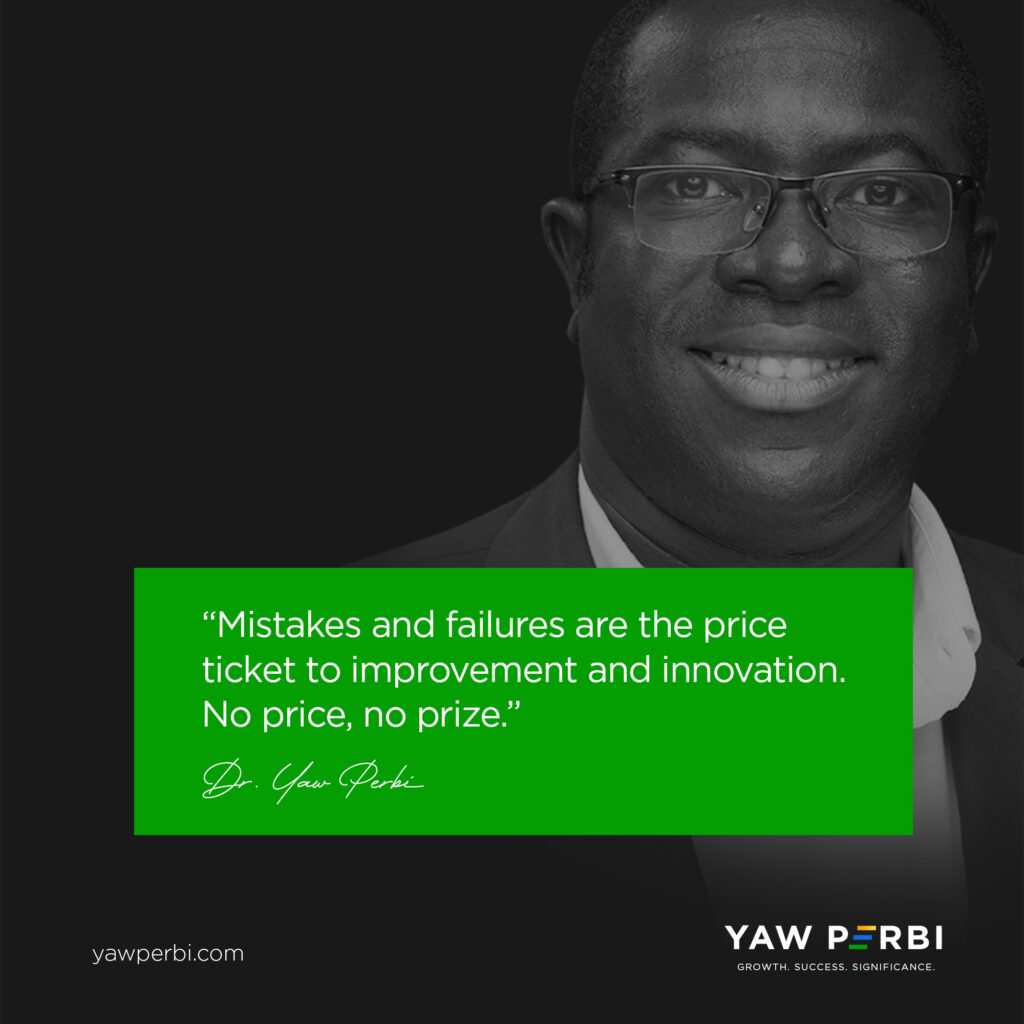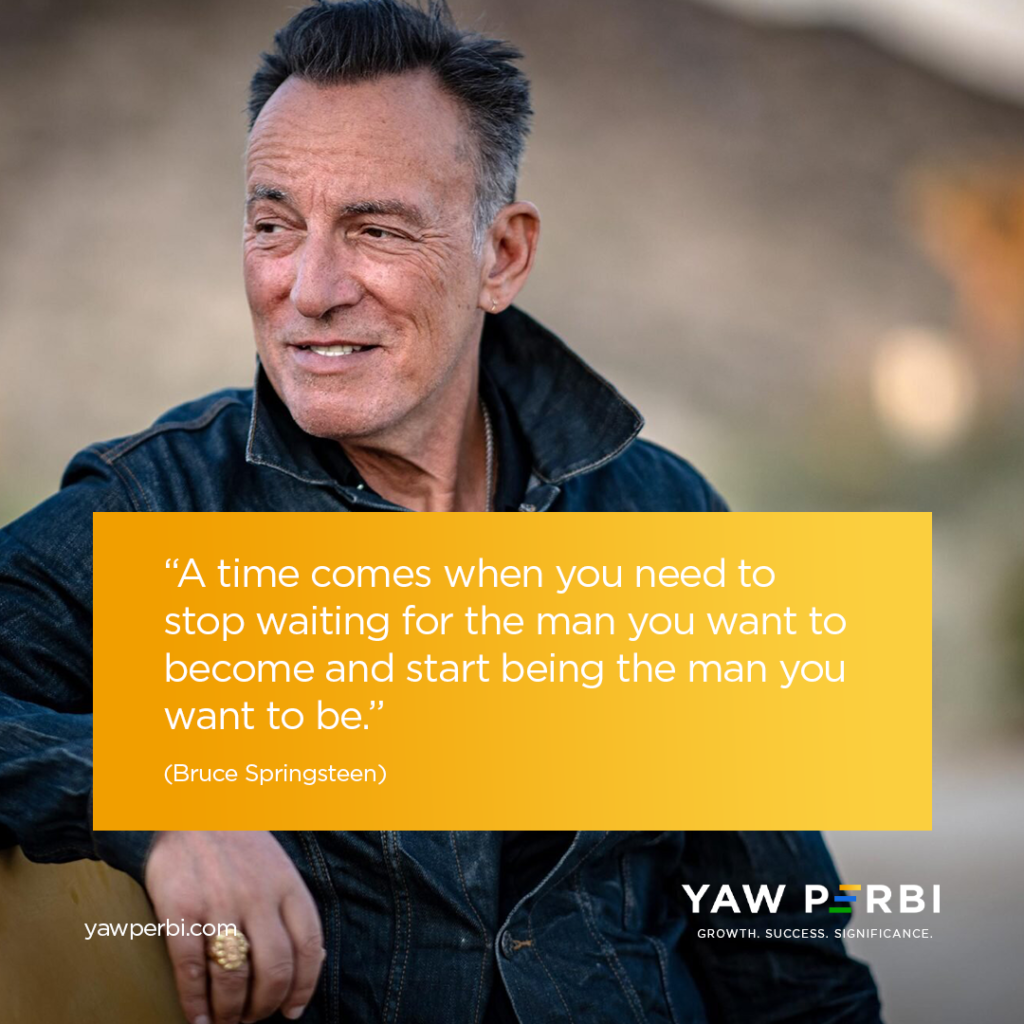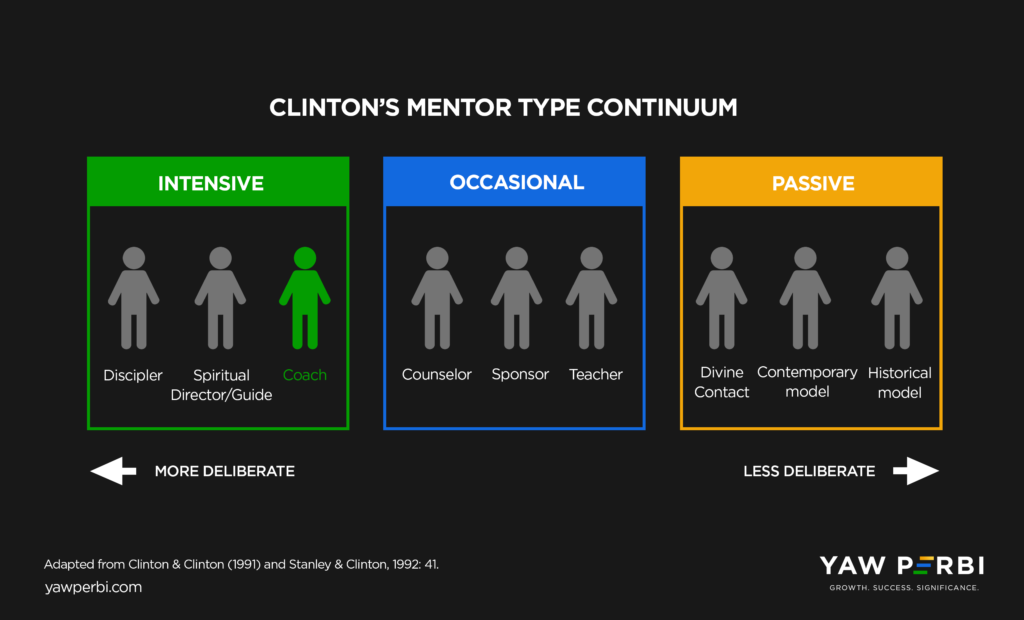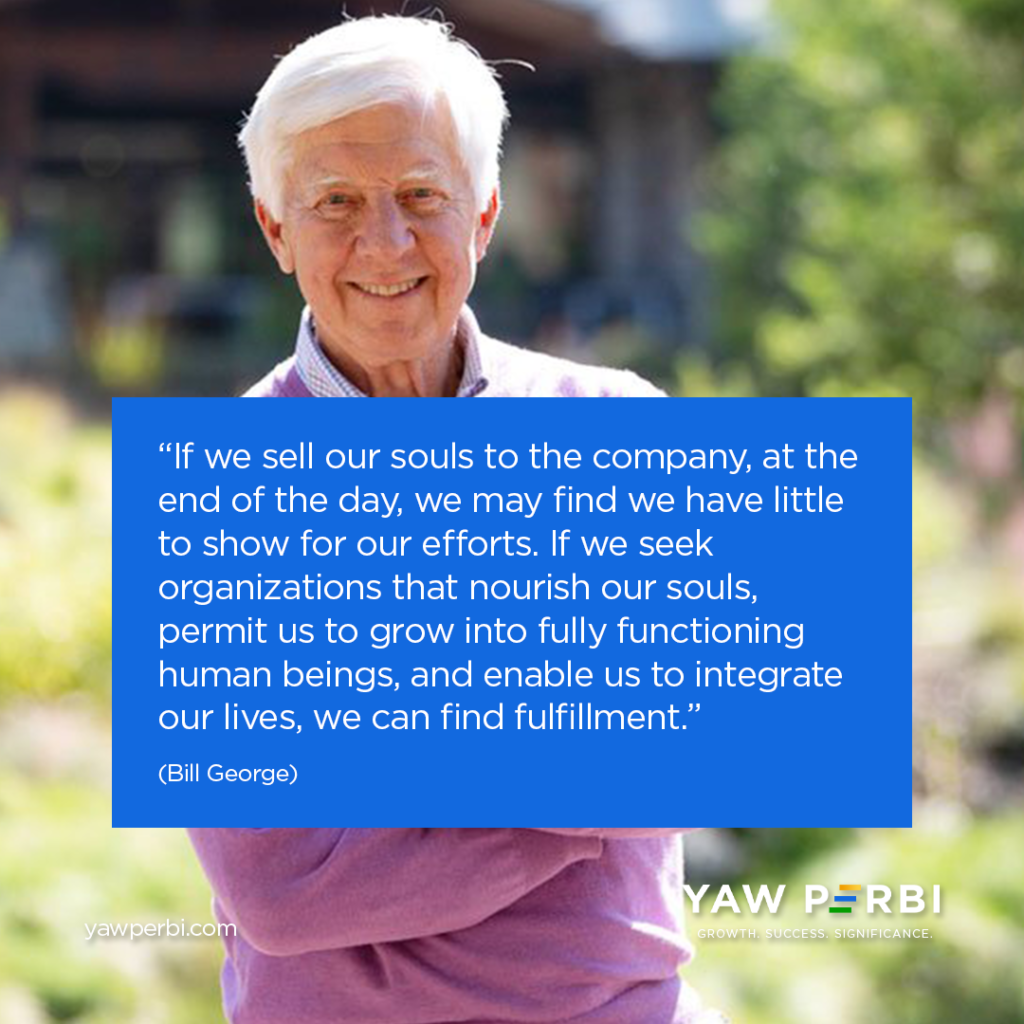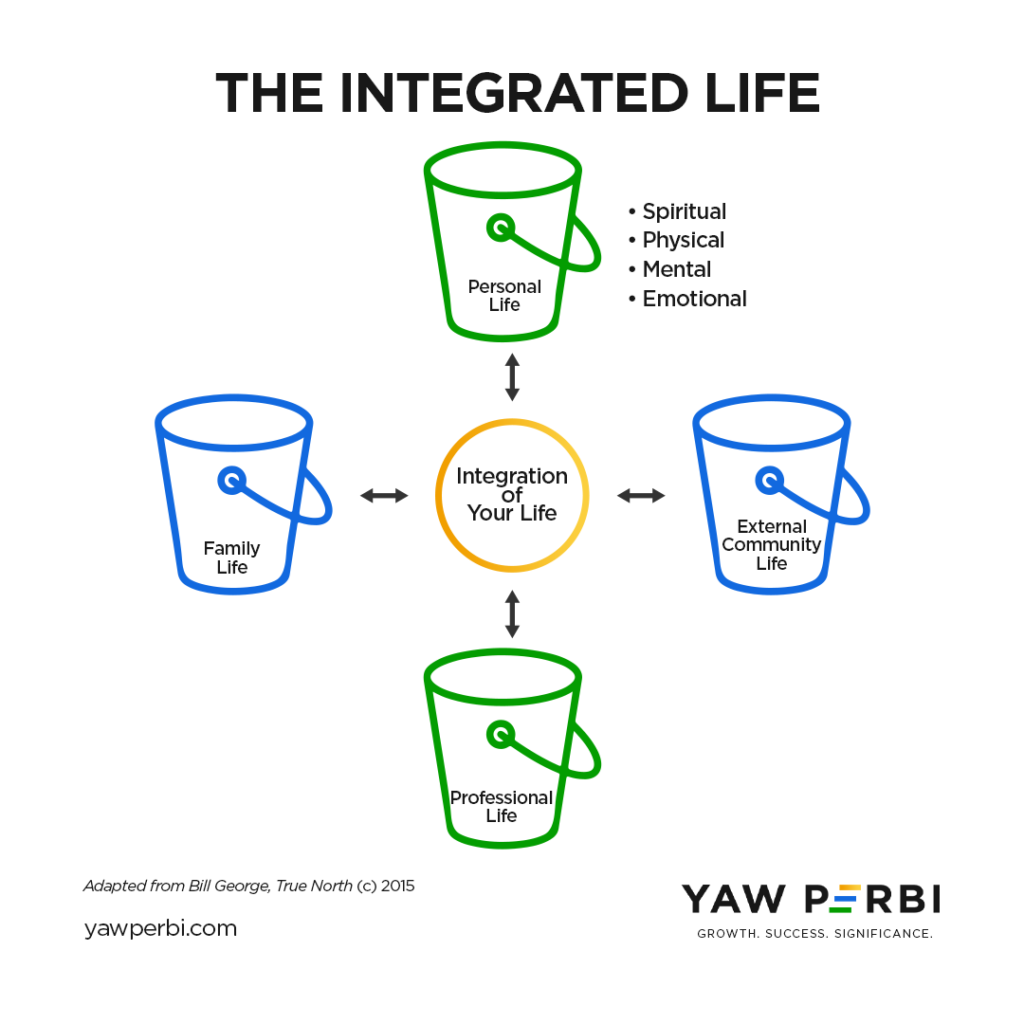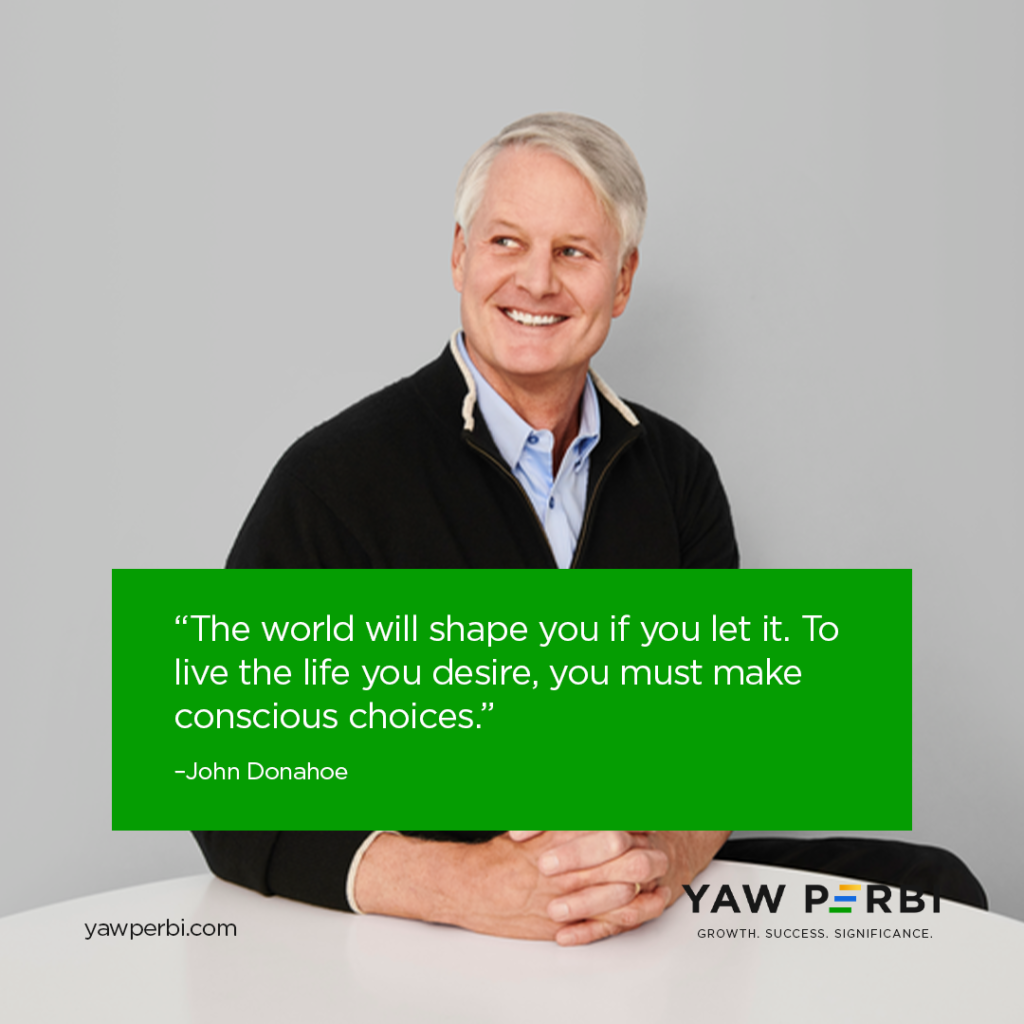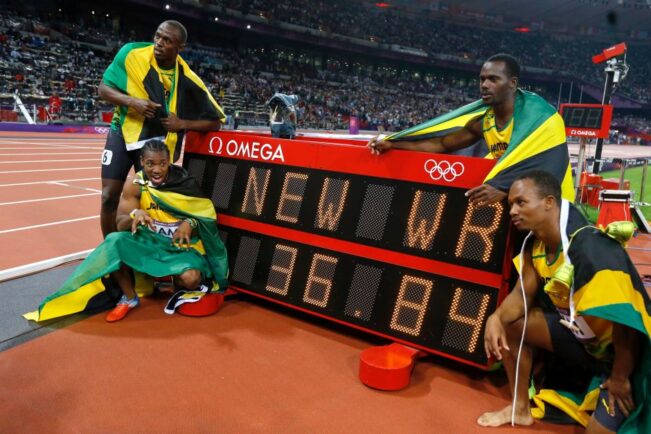
TEAMS | Together Everyone Achieves Most Success
The story is told of an anthropologist who introduced a game to the children of an African tribe. He placed a basket of delicious fruits near a tree trunk and told them: “The first child to reach the tree will get the basket.”
When he gave them the start signal, to his astonishment they were walking together, holding hands, until they all reached the tree. They simply shared the fruits and happily ate them! So baffled, with a furrowed brow he asked them, “Why did you do that when any one of you could get the basket only for yourself?”
They answered with glee, and to his amazement, “Ubuntu!”
“How can one of us be happy if all the rest are miserable?”
“Ubuntu” in their civilization means “I am because we are.” It is Xhosa from the African continent. The venerable Archbishop Desmond Tutu explains: “Africans have a thing called ubuntu. It is about the essence of being human, it is part of the gift that Africa will give the world. It embraces hospitality, caring about others, being willing to go the extra mile for the sake of another. We believe that a person is a person through other persons, that my humanity is caught up, bound up, inextricably, with yours. When I dehumanize you, I inexorably dehumanize myself. The solitary human being is a contradiction in terms. Therefore you seek to work for the common good because your humanity comes into its own in community, in belonging.”
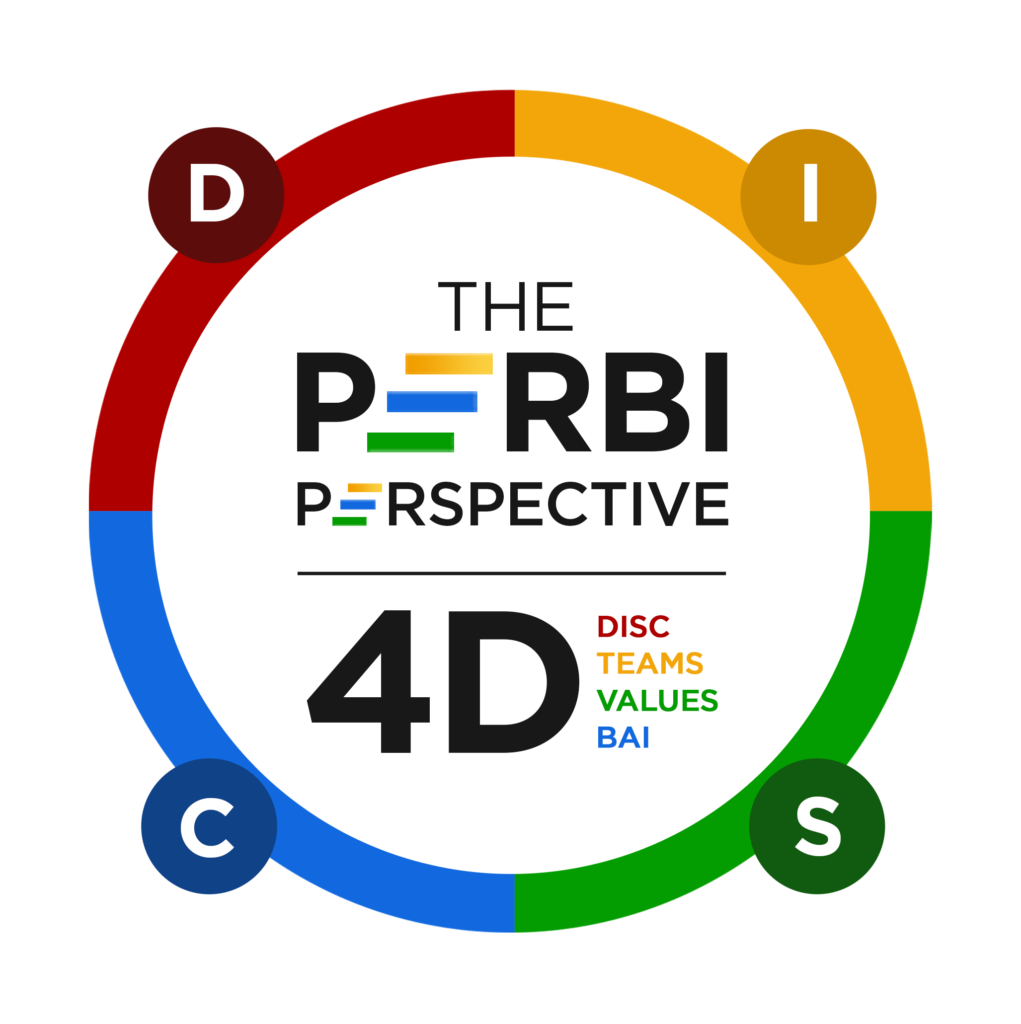
The 4D assessment digs deeper beneath the tip of the iceberg of one’s behaviour as a leader, starting with in one’s unique place in TEAMS
TEAMS THEME LIKE A BROKEN RECORD
Together Everyone Achieves Most Success. The theme of teamwork just won’t go away! To those around me, I must’ve sounded like a broken record over the period. Ah! But broken record will soon take on another important meaning. Read on. It began a couple of weeks ago as I was finishing a write-up for our 4D assessment (image above) at YAW PERBI. The TEAMS portion of the assessment posits that TEAMS should consist of at least one each of a Theorizer, Executor, Analyzer, Manager and Strategist, that idea itself also forming another acronym for TEAMS. No one has all six. Even if they did, they wouldn’t be able to function optimally when all are needed simultaneously. Whatever you don’t have, the Creator has put in someone next to you in your ecosystem. A network is about nextwork, basically a net of next workers.
This became very apparent to me when over these same couple of weeks I happened to be reading the old jewish book of Nehemiah, the guy in diaspora who returned to Jerusalem to lead a rebuilding campaign. The dominant word in the text about the rebuilding is “next.” An array of people, from priests to perfume-makers, male and female, built the next session of the broken walls of the city, some right in front of their house, until walls that had been down for over a century were rebuilt in only fifty-two days! Indeed, teamwork makes the dream work!
Former U.S. President Lyndon Johnson put it another way, “There are no problems we cannot solve together, and very few that we can solve by ourselves.” Going east, the Chinese have a proverb too that says, “Behind an able man there are always other able men.”
BETTER TOGETHER, FOR SURE!
Again over these same couple of weeks, my mother-in-law forwarded a video to me, featuring a passionate speaker who was emphasizing the power of building together. Incidentally, I happened to know the man–pastor Forbes of The Gambia, whose church in Banjul I had the privilege of speaking at about a decade ago. I quickly sent him word that he was trending. And he was. Forbes made a terrific point about how the fastest man in the world remains Usain Bolt of Jamaica, with a 2009 world record he set at 9.58 seconds remaining unbroken by any other human being for a dozen years now. Yet the 4 x 100m relay record by Bolt and three others stands at 36.84s, meaning an average of 9.21 seconds per runner. Get that? That’s a whole 37 seconds better than the best man in the world! That’s the power of team work, of synergy. All of us together, are better than any one of us, even the best of us, any day!
Take the game of soccer too. It doesn’t matter what a great goalkeeper one is, no one wins the game without good strikers who score goals (not to talk of the rest the complimentary forwards and midfielders). In the same way, one may be the best goalscorer in the world but without a strong defence, including goalkeeping, you will be outscored and lose the game. Great leadership assembles a great team of diverse people in gender, ethnicity, age etc. but especially in thinking styles and task orientation.
Every team member has a place where they add the most value. You don’t want to put the best goalscorer as a goalkeeper or vice-versa. You’ve got to know yourself and where you have most value, in order to know where you lack and who to bring on board. Likewise, everyone else on the team should know their niche. In The 17 Indisputable Laws of Teamwork, John Maxwell puts this essential need to have the right people in the right places well on TEAMS as follows:
-
-
-
- The Wrong Person in the Wrong place = Regression
- The Wrong Person in the Right Place = Frustration
- The Right Person in the Wrong Place = Confusion
- The Right Person in the Right Place = Progression
- The Right People in the Right Places = Multiplication
-
-
IN THE END…
All of us together are better than the best of us, any day, every time! Even better than a Usain Bolt! Ubuntu! I am because we are. What is the Theorist without an Executor? What would an Analyzer do without a Manager or Strategist? TEAMS is the way to go. The children of Africa know it. Do we? Together Everyone Achieves Most Success!

It’s Mid-Year. Time to Close Growth Gaps.
One of my goals at the beginning of the year was to record a short video each week to pep people up in LIFE–Leadership, Integrity, Family, Entrepreneurship. Although speaking-wise I am an award-winning Toastmaster and have been on various media, including hosting television programmes even way back in my medical school days and early professional life, somehow I couldn’t bring myself to starting a YouTube channel and recording something ‘short and sweet’ regularly for my colleagues and coachees.
If today the January goal can now be marked as “done,” having recorded something every single week between then and now (June), it is because I had accountability to close a certain growth gap. The accountability I got was first from my Growth Mastermind group where I shared by goal at the beginning of the year. Exactly on January 15, one of the members, a U.S.-based consultant with Accenture, sent a group WhatsApp message reminding me of my action point to start recording that day. Did I feel ready? No. But to keep my word, I did it anyway! Apparently, we hardly ever ‘feel ready’ for anything. At some point we’ve got to “just do it!” It was Bruce Springsteen the musician who once said, “A time comes when you need to stop waiting for the man [male or female] you want to become and start being the man you want to be.”
MY GROWTH GAPS
In the very opening chapter of his masterpiece on personal growth (Maxwell 2012, 3-9), Dr. John C. Maxwell lists eight growth gaps people get trapped by:
- The Assumption Gap–“I assume that I will automatically grow”
- The Knowledge Gap–“I don’t know how to grow”
- The Timing Gap–“It’s not the right time to begin”
- The Mistake Gap–“I’m afraid of making mistakes”
- The Perfection Gap–“I have to find the best way”
- The Inspiration Gap–“I don’t feel like doing it”
- The Comparison Gap–“Others are better than I am”
- The Expectation Gap–“I thought it would be easier than this”
What had been keeping me from shooting my video snippets and starting my own YouTube channel were the Mistake and Perfection gaps. Those two, I find, are actually two sides of the same coin. There was a ton of information online about how to/not to shoot videos. Now, having 10,000 friends and followers on FaceBook and being well-known and respected in certain circles I didn’t want to come across as a jerk! I was being paralyzed by lighting issues, how my little home office should be arranged, which background would be the best, whether my phone camera was good enough etc. etc.
In fact, I look back with a bit of embarrassment at my first YouTube video which I shot in my decade-old comfy sweater with a Covid-19 bushy hair look, yet I’m so proud that I took the dive. Mistakes and failures are the price ticket to improvement and innovation. No price, no prize. My parents’ generation used to ridicule ‘Made in Japan’ products. My generation has high respect for everything Japanese, from Toyota and Honda through Yamaha to Sony. The Japanese were ridiculed as copycats with poor quality products but the kaizen principle of continuous improvement has brought them this far. Today’s generation has no paradigm of a bad Japanese product. They’ve constantly closed their mistake and perfection gaps. Now, some laugh at China the same way. China would laugh last if they too continually close their growth gaps because guess what? “A mistake is simply another way of doing things,” according to author and professor Warren Bennis. After 10,000 hours of practice, you and I can become geniuses at anything, as my fellow black Canadian, Malcolm Gladwell, asserts in Outliers, largely based on his interpretation of Anders Ericsson’s research.
TO MY FELLOW MISTAKE-AVOIDERS
The desire to find the best way and to be the best is good but I learnt from my mentor John Maxwell looking for the best way can actually be getting things backward. We rather have to get started if we want to find the best way. He says, “it’s similar to driving on an unfamiliar road at night. Ideally, you’d like to be able to see your whole route before you begin. But you see it progressively. As you move forward, a little more of the road is revealed to you. If you want to see more of the way, then get moving“ (Maxwell 2012, 7, emphasis mine).

Such powerful words from Schuller’s ‘Hour of Power’ that run for 40 years! What a poignant question!
I once met the American Christian televangelist, pastor, author and motivational speaker Dr. Robert H. Schuller (picture above) in the mid 1990s. As a World Vision Youth Ambassador, my cohort had the privilege of visiting his ‘all glass’ Crystal Cathedral, singing there (oh the acoustics!) and appearing live on his weekly Hour of Power television programme which be began hosting in 1970 until his retirement in 2010. He is noted for many famous quotes but one that has most gingered me to overcome my mistake and perfection gaps has actually been this poignant question of his: “What would you attempt to do if you knew you wouldn’t fail?”
CONCLUSION
So! Half of the year has gone. If you find there’s a gulf between your year-start goals and your mid-year achievements, it’s a growth gap. Ask yourself: “how do I need to grow to close this gap?” If we would resolve to grow and close the assumption, knowledge, timing, mistake, perfection, inspiration, comparison and expectation gaps, we will end the year smiling. Focus on your growth, not so much on your goals. Then you will grow to hit them. I have, in my video-shooting goal. Now off to the rest!
Reference
Maxwell, John C. 2012. The 15 Invaluable Laws of Growth. New York: Center Street.

Google Pizza

This little man might never ever speak to a real human being to order his favourite pizza by the time he’s an adult.
Artificial Intelligence (AI) is exciting and scary at the same time! Here’s a satirical example (there are many variations online) about what should’ve been an ordinary exercise ordering ordinary pizza on an ordinary day.
Hello! Is this Gordon’s Pizza?
No sir, it’s Google’s Pizza.
Did I dial the wrong number?
No sir, Google bought the pizza store.
Oh, alright – then I’d like to place an order please.
Okay sir, do you want the usual?
The usual? You know what my usual is?
According to the caller ID, the last 15 times you’ve ordered a 12-slice with double-cheese, sausage, and thick crust.
Okay – that’s what I want this time too.
May I suggest that this time you order an 8-slice with ricotta, arugula, and tomato instead?
No, I hate vegetables.
But your cholesterol is not good.
How do you know?
Through the subscribers guide. We have the results of your blood tests for the last seven years.
Maybe so, but I don’t want the pizza you suggest – I already take medicine for high cholesterol.
But you haven’t taken the medicine regularly. Four months ago you purchased from Drugsale Network a box of only 30 tablets.
I bought more from another drugstore.
It’s not showing on your credit card, sir.
I paid in cash.
But according to your bank statement you did not withdraw that much cash.
I have another source of cash.
This is not showing on your last tax form, unless you got it from an undeclared income source.
Enough already! I’m sick to death of Google – Facebook – Twitter – WhatsApp and all the others!! I’m going to an island without internet, where there’s no cellphone and no one to spy on me …
I understand sir, but you’ll need to renew your passport … it expired six weeks ago!

A Most Misunderstood Art: Life Coaching.
This tweet by Rebecca Sloane garnered so many responses last week. And it really ticked me off. It said, “I don’t want a 25 year old life coach. I want a 93 year old to tell me the best way to live my life.” It was sassy and seemed sensible at first sight, on the surface, but I just couldn’t shake it off or let it go scot-free. I’ll tell you why. To be clear, I’m going after the thought; not the person. “Ideas have consequences,” you know.
HUMILITY IS AN ASSET
In the first place, with humility anyone can learn from anyone. Everyone can learn something from anyone. The older can learn from the younger, atheists from people of faith (and vice versa), Christians from Muslims (and vice versa), CEO from new hire etc. This was actually better put by Bill Hybels during one of his Global Leadership Summits I attended: “Armed with enough humility, leaders can learn from anyone.” We can learn from children. Heck, we can even learn from flora and fauna! The greatest teacher that ever lived would place a little child in front of his class and say, “unless you change and become like children…” The good book says, “go and learn from the ant.” With enough humility, everyone can learn something from anyone and anything. Point made.
More substantively, this statement of Rebecca’s is a gross misunderstanding of coaching and as a certified professional coach I would like to set the record straight.
COACHING IS…
Apart from a number of group coaching sessions I run, I am personally dedicated to about a dozen one-on-one coachees, mainly C-level executives ranging from a CEO in agribusiness to deputy CEOs in mining and banking. How does a trained medical doctor get to coach these leaders in such different fields? Meanwhile, some of my coachees are much more advanced in age than me as well. What do I have to offer them then?
Coaching is an inspiring and empowering process that utilizes cogent questions to draw out and clarify thoughts and desires and facilitates a path and framework for their successful implementation for the growth, success and significance of the coachee. As my friend Barbara Wainright, a certified professional coach and trainer of coaches herself, puts it, “Coaching is about empowering your client by asking questions, facilitating strategic planning and monitoring tactical execution.” That is the number one tool of a coach: questions. In fact, with their penchant for asking question upon question, children would probably make much better coaches than adults with a little training and guidance! Yes, that’s how come a 25-year old can coach the writer of the tweet and anyone else twice or thrice their age.
I know I’ve hit a spot whenever a coachee goes, “good question.” The questions a coach asks bring clarity to one’s thoughts and desires, the coaching process inspires coachees to want to be the best versions of themselves they dream of and provides a framework of accountability to make their own word come true. One of my favourite preambles I love to hear from coaching clients is, “I’m beginning to realize…”
Successful life coaching isn’t about the coach–whether they are a 25-year old novice or a 93-year old veteran. It isn’t about what the coach knows, what they’ve accomplished, or even what they are doing in life. It is all about the client.
In fact, as Ms. Wainright reiterates, “coaching is about empowering your clients to decide for themselves what their goals are. It’s about Socratic Questioning and attentive listening. Coaching is about understanding your client’s needs, goals, desires and life purpose. Coaches help their clients to identify and clearly articulate their goals and dreams. Coaches help their clients to remain accountable and help strategize the action steps required to achieve their objectives.”
COACHING ISN’T COUNSELLING OR CONSULTING
I have been wanting to make these distinctions between coaching, counselling and consulting clear for quite a while as even prospective clients sign up for coaching with me expecting a masterclass or therapy session of sorts. Ms. Sloane’s tweet was the last straw that broke the camel’s back. As a student of Dr. Robert J. Clinton’s work at Fuller Seminary, I am of the opinion that coaching, counselling, and consulting are all types of mentoring (see an earlier blog here). Counselling, consulting and coaching have at least one thing in common: they all require great listening skills.
However, counselling is about helping your client by listening and offering advice and sharing coping skills. Consulting is about having all the answers and solutions to help your client with a specific task (hopefully after listening well). There is some form of mentoring (I’m not sure what to call it, perhaps ‘combo-mentoring’?) that combines coaching, counselling and consulting where the mentor empowers the mentee by asking questions, sharing valuable experiences, giving advice for growth and solutions for success. Strictly speaking, that isn’t life coaching in the purest sense of the art.
As may be obvious to you by now, counselling, consulting, and this combo-mentoring all require one to be significantly knowledgeable about the issues being addressed. That would make Rebecca Sloane’s tweet understandable but coaching on the other hand, requires the ability to ask contemplative questions, listen incarnationally, and ask even more profound follow-up questions till the client finds their own answers and makes their own commitments. Consequently, the coach doesn’t need to even know about the client’s field or have experience in the area of life they want to be coached in to help them. With the others, the professional is the driver; with coaching the client is.
DEAR REBECCA…
So dear Rebecca, a life coach doesn’t tell you anything, let alone how best to live your life. There are over 50 coaching niches–from life coaching to executive coaching to career coaching. None of them tell you how to live your best life but they will set the table for you and provide a menu of questions for you to figure out what your life meal should comprise of. For sure, find a 93-year old counsellor, consultant or combo-mentor to tell you how best to do life but if it is a coach you’re really looking for, even a 25-year old novice would do. It is about their questions; not their answers. It’s about you; not them.

Inspiring Practical Examples of the Integrated Life

Dinner with the organizing team of an annual conference in Halifax, Nova Scotia (Canada) at which I was a plenary speaker. If you look closely at the back left you will find my then seven-year old son and I. We did the 2,500km trip by road together.
After my last blog on Why I strive for work-life integration and not work/life balance, some got it and said, “important distinction.” Others thought it was just semantics, just a different choice of words but saying the same thing. I beg to differ.
Here’s another attempt to distinguish one from the other: work/life balance (apart from seeming to pit work against life) is the attempt to distribute time, energy and other resources equitably to all four buckets of life to ‘tick all the boxes’. On the other hand, work-life integration is radically different because it harnesses the power of all four buckets, making other buckets better by the power of other buckets. And it is living in such a way that one doesn’t have to hide the other buckets (say, on LinkedIn), pretend they don’t exist or be different things to different people in the different buckets. I’m quite certain a few poignant examples below may make the distinction clearer.
FACEBOOK AND FAMILY
Who doesn’t know about FaceBook and its 2.7 billion users. That number is the combined population of China and India, the two most populous nations in the world. 2.7 billion is more than twice the population of the entire continent of Africa! I was fascinated to learn that as founder/CEO, one of Mark Zuckerberg’s attempt at the integrated life in Facebook’s early days was to host FaceBook strategy sessions at his home on Monday evenings. And for Facebook’s COO Sheryl Sandberg, instead of missing dinner with her family, she would bring her children into the office. Here’s her testimony: “Facebook is incredibly family friendly, so my children were in heaven, entranced by pizza, endless candy, and the huge pile of LEGOs the engineers shared with young visitors. It made me happy my kids got to now my colleagues and vice versa” (George 2015, 173). I don’t know everything about FaceBook’s corporate culture, but these right here are great examples of the integrated life at FaceBook.
I’m proud of Databank in Ghana that has created a nursery in the workplace for nursing mothers as well as a quiet time room for staff to go and nourish their spiritual lives, especially after rushing from home at dawn in order to beat the crazy Accra traffic. These are laudable examples of the integrated life in corporate circles.
PERBI PRIDE
I love lions. I call my children cubs; not kids, hence we are the Perbi Pride. Last week, I handed over to the next CEO of ISMCanada after being at this role for eight years. One of the things I recalled at the handing over ceremony (and nearly everyone remembered) is how not long after I took the role I travelled almost the entire stretch of Canada (the second widest country on earth!) to get to personally know the staff and listen for the pertinent issues from the ground. What I haven’t told you yet is that as a family we decided to integrate our lives with my new work by making this a fun family trip. We rented a minivan and spent 30 days travelling from Montreal (on the east coast) to Victoria (beyond Vancouver) in the west. It was beautiful to see the different types of Canadian landscape and wildlife. Because our children our homeschooled, such opportunities are precious as ‘all of life is school.’ By the time we got back home we had clocked 13,000km and had enough geography, history, sociology etc. to last a lifetime! That is one of the best examples of the integrated life we’ve ever had as a family. Family did not get in the way of work or vice versa. We made both feed off each other and were the richer for it.
Over the last couple of years, I have adopted a tradition of travelling with one of the older four children. Just one, to make them feel special and have a one-on-one time with daddy. Don’t forget these are work trips for me and fun trips for them. After doing a Philadelphia and Washington DC road trip with our then four-year old she insisted upon returning home that “I’m Daddy’s travel buddy’ much to the chagrin of the others. I’ve been far from perfect in integrating family and work but I knew we were doing something right when my children got so used to the ISMCanada world that one day our then seven-year old son asked, “Will I become president of ISMCanada when I grow up?” Almost as if it were a family inheritance.
I’ve always worked from home over the last 8 years as CEO (or from an airport/airplane)–way before the rest of the world was forced to by the Covid-19 pandemic. Working from home and homing from work has its pros and cons but it certainly has helped more than harmed my work-life integration.
IMPACTING THE WORLD FROM WITHIN–‘AN INSIDE JOB’
In an article posted on the Harvard Business Review, author Stew Friedman rightly said that the most impactful leaders find ways “to integrate the different parts of their lives to reinforce and enhance each other.” Everywhere he looked he found successful individuals who used who they were as a person to influence how and why they worked. From Facebook COO Sheryl Sandberg (as I already shared above) through Michelle Obama to rock icon Bruce Springsteen, many influential people channel what made them a powerful person into creating a powerful product, service or project.
Take Michelle Obama, the 44th First Lady of the United States, for example. Michelle considers her daughters to be her first priority, even if this stance vexes those who would have her do more in seeking broader political and cultural change. However as Friedman rightly observes, in making sure her own children were receiving the most nutritious food possible, she began to advocate for better nutrition through the national initiative Let’s Move!. Her policies have won national and global acclaim.
One of the most impactful social enterprises in Ghana right now is the PerbiCubs Library Services, reaching 2,000 children in 200 schools. It might interest you to know that this did not start out as some mega altruistic attempt to ‘change the world’ through getting every child reading but out of our own family’s need for good, well-curated, reading level-appropriate books upon a long stay in Ghana. Whether it’s the Obamas or the Perbis, we’re running this for ourselves–we only get to scale and share with the rest of the world. If nobody signed on, we would still do it. It’s not just a job ‘out there’, it’s an ‘inside job,’ so-to-speak.
RUNNING MY FAMILY LIKE A CORPORATION
I’ve had partners complain about how their spouse is great at XYZ in the corporate world but doesn’t show even an iota of that competence or skill at home. There are those who might argue that they use ‘all of it’ out there and just want to chill and relax when they get home. While that might make some degree of sense, is it not inauthentic that who we are out there is different from who are at home? If you really believe in the power of vision and mission statements and values in your corporate world, for example, how come you haven’t couched one for your own family?
I’m learning to run my family like a corporation, in the sense of applying the things that have made organizations I’ve run succeed. Why not? Wherever two or three come together, you have an organization! I’m sure you can relate to how some of the most treasured members of your community, say church, actually are so because they bring their corporate skills to bear on the communal organization? On the flip side, I’ve also been the beneficiary of running businesses like family and seeing co-workers go over and beyond their job description and their contractual call of duty. The integrated life is the way to go.
CHOOSE INTEGRATION TODAY
“When you give your whole self to the moment, you not only benefit personally, but it dramatically impacts your business as well.” So says my mentor Bill George. The work-rest of life thing doesn’t have to be a zero sum game. Bill is right about how “Many leaders are reluctant to combine their work and family lives, but bringing the two together can lead to more productive and fulfilling lives, both personally and professionally” (173). I have seen and testify that it takes being open-minded about this work-life integration notion, hard work, creativity, experimentation, patience, much discomfort and many failures to make it work but when it does, it really does.
References
Friedman, Stewart D. 2014. “What Successful Work and Life Integration Looks Like.” Harvard Business Review. October 07, 2014.
George, Bill. 2015. Discover your True North. Hoboken, NJ: John Wiley & Sons.

Why I Strive for Work-Life Integration and not Work/Life Balance
Even as a boy, I felt there was something not quite right about hardly knowing my dad’s fellow partners and their families at the ‘big four’ accounting firm he worked at. Of course I knew a couple of the names and faces but that was about it. I felt they could organize some social events and such to intentionally bring their families together but hey, what did I know?
In fact, even now I wouldn’t be able to make out the wife of the senior partner when dad was deputy senior partner. The very kind, burly man’s children currently live barely five hours away from my family in the same country (Canada) but we don’t know each other well enough to even give the other an occasional ring. Oh wait, I got to talk to one of them once, when their dad was seriously ill and had been hospitalized in their town, but that’s been about it.
I think what I longed for, even as a boy, was a bit more of work-life integration, without even knowing that was actually ‘a thing’ or that such a term even existed. A feeble attempt at it has become largely known in the corporate space in recent times as “work/life balance” but what I speak of is more profound than that. How can anyone not see that there is a problem pitting “work” against “life” as if life doesn’t encompass work itself as well as one’s personal life, family and community? And it doesn’t have to be a zero sum game, work or die, inasmuch as there tends to be many tradeoffs.
BUY ONE, GET THREE FREE!
It’s a no brainer that having a bad home situation can adversely affect your professional performance and vice versa. Also, despite how stringent your personal health routines might be, your community relationships are a significant determinant of your mental and physical health, a 75-year study proves. Life is not as separate as we would like (or like to think). Somehow we know this when it comes to how something negative in one aspect of our life can spill over to botch another aspect but what if I told you that being a great dad can make you a better CEO or that the skills you use in your community can be a life-saver in some work project? Yeah, work/life balance isn’t the way to go; work-life integration is. I’ll tell you why.
Author Stewart Friedman concurs: “From years of studying people in many different settings, I have found that the most successful people are those who can harness the passions and powers of the various parts of their lives, bringing them together to achieve what I call “four-way wins — actions that result in life being better in all four domains.” These four domains Stewart speaks of are illustrated in ‘The Integrated Life’ diagram below. He continues, “My research has shown that there are ways for everyone — from the managers of sales teams, to executives in government agencies, to computer engineers, to florists, to coaches — to achieve professional success without always having to sacrifice the things that matter in their personal lives.”
COVID-19 BLESSING IN DISGUISE
One of the gifts of the COVID-19 pandemic has been to not only highlight how important the place we call “home” is, but how it is central to our children’s formal education and our own professional lives. Heck, we’ve even done community, like church, from home! Online. This is perhaps the most physically integrated most people have been in their entire work lives. And those of us who like to keep everything prim and proper with no drama have had a really hard time.
I do a fair bit of social media. I find FaceBook much more integrated in terms of all four aspects of life than say, LinkedIn. Several times, I have seen people literally apologize and “make an excuse” or “make an exception” to post something faith or family-related on LinkedIn. I’ve tried to push those boundaries myself sometimes but it’s a weird, I must say. When I recently shared on LinkedIn that I daily run the daycare at home for the youngest ones of our seven children, I was really honoured to have one of my mentors, Bill George (Harvard business school professor and former CEO of Medtronic), affirm me as follows: “Thank you, Yaw, for being the authentic leader you are.” This must be why: Bill really believes, “For authentic leaders, being true to themselves by being the same person at work that they are at home is a constant test, yet personal fulfillment is their ultimate reward. Doing so will make you a more effective leader in all aspects of life“ (George 2015, 16).
WHERE THE RUBBER HITS THE ROAD
At a just-ended eight-week Family Foundations Mastermind I hosted, the prime place of family was underscored over and over again but by the penultimate session we needed to ‘get real.’ How do we do family well while keeping a demanding job, juggling community roles and trying to stay sane? This is where the rubber hits the road.
As I’ve stated before, integrity comes from the Latin root integritas which means whole, entire, undivided. On the other extreme are those who completely separate their professional life from other aspects of their lives. Then there are those who in the name of work/life balance, hop from one of the four parts to the other, trying to “fulfill all righteousness” and tick every box with as little guilt as possible. What I subscribe to and strive for is integration. Bill is blunt: “To lead an integrated life, you need to bring together the major elements of your personal life and professional life, family and friends so you can be the same person in each environment” (159-160).
We’re striving for the word integrated rather than balance. Subtle difference, apparently, but HUGE. Stewart gets it: “The idea I think to replace work/life balance, which treats these categories as independent, is work/life integration. You’re treating yourself whether you’re at work or at play in basically the same way.”
BIG ROCKS FIRST
All the buckets don’t have the same weight. I believe we ought to carry the more important yet not always more urgent buckets of personal and family first, putting the big rocks in first as Stephen Covey would put it, and all the other things will be added to us as well. Easier said than done, but it must be done nonetheless.
My favourite corporate example of this is Nike CEO John Donahoe (former eBay CEO), when he was a consultant with Bain decades ago with a young family. I was most impressed about how he told his client, ”It is important to me to be doing this. I’m committed to working hard, but I can’t be there before 10am.” This is because he insisted on taking his children to school before heading to the client site. The result? Donahoe was amazed that his clients appreciated the choices he was making. “The client responded positively as he appreciated my commitment and contributions even more” he says. “I didn’t have the courage to think about it that way before. There’s an inclination in business to put on a tough exterior to give the impression that you have everything under control” (162).
Bill George reports that “Donahoe learned that the more he integrated his life and embraced his humanity, the more effective he became as a leader … by showing his team and clients his [priorities and] vulnerabilities, he discovered his teams performed better and his client relationships strengthened.” (162)
This is not to say it’s all easy; but it’s worth it–just like med school or doing an MBA. Hear Donahoe: “The struggle is constant, as the trade-offs and choices don’t get any easier as you get older. My personal and professional lives are not a zero-sum trade-off. I have no doubt today that my children have made me a far more effective leader in the workplace. A strong personal life has made the difference” (160).
To be whole (integritas), we need to integrate our personal , family, community and professional lives, not pit one against the other like ‘work/life balance’ suggests. Real life happens were all four meet and they can enhance each other. Indeed, they should. It isn’t easy. How do I know? I’m still trying. So should you. It’s worth it.
In my next blog, I will share a number of practical examples and ideas of how people have made life-work integration happen, and how my family and I have tried to, also.
References
Friedman, Stewart D. 2014. “What Successful Work and Life Integration Looks Like.” Harvard Business Review. October 07, 2014.
George, Bill. 2015. Discover your True North. Hoboken, NJ: John Wiley & Sons.
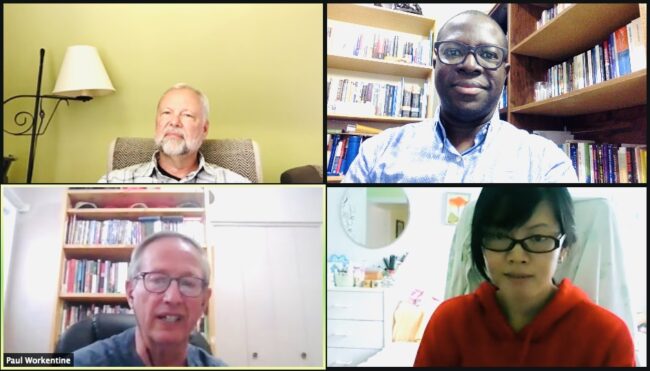
How to Leave the Dance Floor | Two Thoughts on Succession.
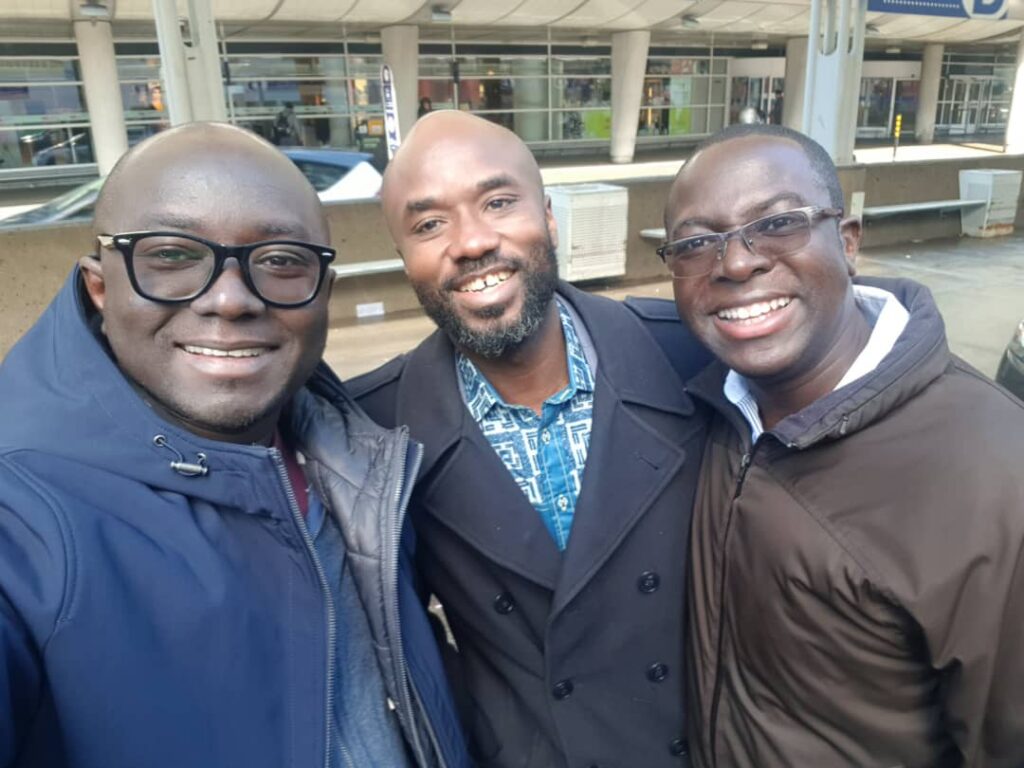
At the Pierre Trudeau international airport in Montreal, Canada, with two leaders, William and Emmanuel, who succeeded me as CEOs of The HuD Group in Ghana and Canada respectively. We had held a strategy meeting just before the COVID-19 pandemic seriously hit the Canada and the U.S..
In my last blog we discussed when to leave the dance floor as an executive leader. Today, let’s talk about how to leave the dance floor. I agree with those who prefer ‘succession management’ to the term ‘succession planning’ because planning, come to think of it, really is only a third of the management cycle which comprises planning, implementation and evaluation.
I have several succession management experiences in my leadership career spanning over two decades. These have been in multiple C-level roles and contexts, even in different countries and continents.
SUCCESSION SUCCESS STORIES
After pioneering The HuD Group in Ghana in 2003 and leading it for five years, I successfully passed it on to the next national CEO and left for Cote d’Ivoire to pioneer the same work of holistic leadership development there while serving with the United Nations peacekeeping operation. The Cote d’Ivoire transition, when it was time to leave after a year, was one of the trickiest. The very week I was to leave, the one person who had hitherto faithfully served alongside me and was the ‘heir apparent’ suddenly and strangely broke my trust in a significant way. The ‘next best’ I eventually handed over to, ended up being truly the best. Timothée led the organization for a decade and has now also successfully passed the baton to an amazing lady, Ann. Timothée is now the CEO of Francophone Africa for the same organization. We have been working together for over a dozen years. We do not only have a mentoring relationship but are really friends, having spent great times together in several African countries as well as in the U.S. and Indonesia. I have done the same kind of succession management in Canada, handing over The HuD Group I pioneered there in 2010 to a very capable young man who at the time was working for Shell in the oil sands of Alberta.
In a different scenario, although I was initially hired to be interim pastor of the English congregation of a Chinese church in Montreal, when it was time to get serious about handing over to a successor after about three years, several people did not want us to go that route. They liked me and had gotten comfortable with the progress we were making in several areas but I knew it was the right thing to do. As a leader, I had figured out that the church needed to find someone who could give their full attention to the work and not my part-time investment, albeit fairly substantial. That too was an interesting succession management process as it involved interviewing candidates from Canada, the US, Taiwan and the Philippines. It’s been about five years since we eventually hired a young trilingual Chinese-Canadian, Rev. Joseph Cherng, and the church has been thriving since he took over over from me. Again, he consults me from time to time and we are good friends, even visiting our home to share fellowship together with our spouses.
As I shared in the previous blog, I have just made my way off the dance floor after an eight-year tenure as president of ISMCanada and still in the midst of succession management even as I write this blog. I like the fact that in their statement to the organization, the board mentioned that I gave them a whole year’s notice of my stepping aside. That is how to do it–give ample time (unless, of course, it is an emergency). A recent meeting at ISMCanada had two former presidents (myself and Paul Workentine, who handed over to me in 2013) and the new president of ISMCanada (Jakob Koch) all in the same Zoom breakout room (picture below). All three of us still have roles in the organization concurrently. A blessed rarity!
Apart from leaving the dance floor when people are still enjoying your dance, there are two other mindsets that have helped me succeed with regards to succession management in the several leadership transitions in my leadership career in multiple roles and contexts First, “leadership success is measured by succession” and then, “always be closing.”
MINDSET #1: LEADERSHIP SUCCESS IS MEASURED BY SUCCESSION
One of the things that has helped me to be largely successful in all the above stories, even amidst challenges, has been a leadership jewel I picked from John Maxwell’s 21 Irrefutable Laws of Leadership about 20 years ago. According to John’s Law of Legacy, a leader’s lasting value is measured by succession. So unlike other leaders, and I’ve seen many such in Africa, who even want their successor to fail so that they look good, I have always viewed by success as a leader by how well my successor does. You don’t want your successor to look bad just so that you look good. That is bad leadership.
In all the above successful succession stories, my pride is in the fact that these subsequent leaders are doing well, even better than I did in me era. If really leadership is about the people we serve and the noble purpose we share, then any true leader would want to measure their success by a successful succession!
MINDSET #2: ALWAYS BE CLOSING
When I was a financial consultant with Investors Group Canada, I had a fascinating Italian gentleman called Carlo in charge of my unit. He was quite the mentor figure, doing some rounds with me and even taking me to his home on the east end of Montreal once. Carlo was a straight-shooter and his large clientele was evidence that he was doing something right. He is the guy who first taught me to ‘motivate and disturb’ in the sales process. But the most important thing he taught me about sales, I find applies to succession management as well. He called it ABC–Always Be Closing. That must’ve been his short version of Stephen Covey’s second habit of successful people: begin with the end in mind.
To Carlo, what was the point of all the prospecting, phone calling, presentation preparation, sales conversations etc. if it all these activities in the sales process don’t end up in a sale? But in order to close the sale in the end, one has to have that mindset and talk and behave as a closer right from the beginning of the conversation–even before the beginning–and throughout the conversation. ABC–Always Be Closing.
When it comes to succession management, I feel the same way. Always Be Closing. Right from taking a position or role, one needs to begin with the end in mind and start succession management. Always Be Closing. What if the day after you become VP or CEO you’re hit by a bus? What happens to your organization? Even barring any such tragedy, the reality is, every leader, no matter how good and gifted, will have to leave one day. No one and nothing lasts forever. From the very day I took on the CEO role at ISMCanada, I identified a possible successor and hinted him. Always be closing.
CONCLUSION
So succession management should be as basic a mindset and requirement as ABC for every would-be-successful leader. Beginning with the end in mind, Always Be Closing. And if one truly believes their leadership success is measured by successful succession, it will make all the difference in how they leave the dance floor. Leadership success is good, but significance because succession was successful, is even better!

When to Leave the Dance Floor.

Visiting the Kakum National Park in Ghana with my senior leaders, hailing from six different cities in Canada. Fun fact: the famous canopy walk at this park was built by two Canadian engineers, assisted by a Ghanaian crew.
This month I clocked eight years as president and CEO of a strategic Canadian charity in the international education space. I was headhunted for the role and felt privileged to be the first ever black president of our almost 40 years old organization. We provide hospitality, faith exploration opportunities and leadership development for the over half a million international students in Canada to be empowered to impact the world. I’ve had the privilege of leading about 90 incredible staff across 23 cities from coast to coast–Canada is the second widest country on earth after Russia–and oh yes, we have a staff family serving in Australia too.
SO WHY ARE YOU LEAVING?
In the first couple of years under my leadership, we grew by about 70% (short of my 100% goal) in new staff and new fields, expanding into about a dozen new cities, extending coast to coast for the first time in the organization’s history. There’ve been many more exciting things that have happened, including seeing such a rich diversification of our staff to about 15 nationalities. One of my greatest joys has been to see former international students becoming leaders of our work in cities, regionally and even in senior leadership. Every quarter we chronicle story upon story of incredible impact on students/scholars by staff and volunteers and impact of our students and alumni around the world, from Australia to Zimbabwe! We’ve seen an organization little known organization gain significant recognition in the international education space in Canada and abroad. Together with the leaders and staff, we worked to move organizational health from OK to healthy to flourishing (as independently adjudged by a third party firm). When I hear of CEO versus board tussles I cringe and thank God that this has been far from my experience. I’ve had such a congenial and synergistic relationship with the board, which has rotated through four chairpersons over the period I’ve been president.
If everything is going as well as I claim, then why am I leaving? My work is done! I believe every leader has a particular purpose to a particular people in a particular place for a particular period and when your work is done, you pack up and go, leaving the place and people better than you found them. I had initially been approached for this role in late 2012 and had laughed it off, especially since I was not only running The HuD Group, which had just received charitable status in Canada, but was also doubling as interim pastor for the Montreal Chinese Alliance Grace Church. Eventually I did take the five-hour flight from Montreal to Calgary to interview with the board. When Anyele and I prayerfully decided to make some adjustments and finally accept the board’s offer, I specifically stated that I planned to do this presidency for three to five years. In fact, I ensured it was clearly spelt out in the documentation. Well, guess what? It’s been three plus five years. It’s time to go!
MUSIC AND DANCING WITH GRAPHS
It is time to leave because my particular purpose to a particular people in this particular place for this particular period is done. As a wise saying in Africa goes, you leave the dance floor while people are still enjoying your dance. What Africans say so well idiomatically, Westerners tend to express graphically. So below is a pictorial illustration of what I’m saying.

Just before the peak is when your dance is still being enjoyed. That’s when you leave the dance floor.
While the above graph refers to the life cycle of any organization per se, it is similar to the organizational leader’s cycle too. Don’t wait to peak, let alone to get into decline and eventual death. That is not great for your leadership but even worse, not good for an organization you supposedly believe in (and even love). Just before the peak is when you collaborate with the ‘DJ’ (stakeholders) to start another song i.e. launch another initiative, start a new programme, launch a new organization etc. Just before the peak is when your dance is still being enjoyed so you either start another song or gracefully leave the dance floor!
By the time one hits the peak itself, you are stretching it. Folks are beginning to get tired of your moves. After the peak, it’s all downhill, babe! And no matter how hard you dance (in spite of how very tired you might be) no one’s excited anymore. Not only have eyes started rolling all the way into the head, some may even have begun yawning by now. Bored. Yet, some leaders still don’t get it! Whether it’s because of the adrenaline rush on the dash floor or the perks of the position, they keep dancing and dancing and dancing, while they keep losing the audience until the music is over! Some even keep dancing after the music is over, dancing to the music in their heads. It’s a fight together them off the dance floor! If you don’t leave the dance floor while people are still enjoying your dance, at least leave while the music is still playing! Worst case scenario, far from ideal, leave when the music is done.
A POLITICAL CONCLUSION
Knowing when to leave the dance floor is more of an art than a science; it’s a soft thing akin to discernment and intuition. The greatest leaders like Nelson Mandela have it; they just know. When everyone was urging Madiba to do a bonafide and very welcome second term in office as South Africa’s first black president who had had a good run, he declined. “No, please.” Nelson Mandela left the dance floor while we were all not only still enjoying his dance, we were urging him on for more moves!
Knowing very well that some leaders wouldn’t have what it takes to leave the dance floor even when it’s obvious, many spheres of society have term limits on executive roles. Most political jurisdictions have a maximum of two four-year terms. As an African, I’ve been embarrassed by how many of our leaders haven’t had what it takes to gracefully leave the dance floor while we were still enjoying their dance. Mandela, unfortunately, is more of an exception than the rule. As a former United Nations peacekeeping soldier, I’ve tasted first hand the horror of the ravages of civil strife and war when leaders don’t want to leave the dance floor even after the music is over. I hate it!
I join those concerned about the “pandemic of ‘third terminism‘” in Africa, including in the West African country I served in as a U.N. Peacekeeper from June 2008 for a year and lost two of my medical colleagues to death. Oxford defines ‘third terminism’ as the phenomenon of leaders seeking to break constitutional term limits—usually set at two terms in office—to secure a third term in office. The phrase has also been used more broadly to refer to leaders who refuse to leave power. This isn’t uniquely African; it is simply human. Recently, Putin has done it in the east and in the west, Trump did not want to leave the floor when his music was over. In fact, it was Franklin D. Roosevelt’s ‘third terminism’ (he won, even a fourth!) and the popular fallout about the concept of a long-term president that led to the ratification of the 22nd amendment in 1951 that “No person shall be elected to the office of the President more than twice…”
According to the National Constitution Centre, “Franklin Roosevelt wasn’t even the first Roosevelt to seek a third term in the White House. His distant cousin, Theodore Roosevelt, ran unsuccessfully as a third-party candidate in 1912, after declining to run in 1908. President Ulysses S. Grant also sought a third term in 1880, but he lacked enough party support to get a nomination.”
George Washington, the first U.S. president, had set the two four-year terms maximum precedent in 1796 when he declined a third term. In 1799, a friend urged Washington to come out of retirement to run for a third term. But as I earlier asserted, the greatest leaders know when to leave the dance floor–and stay off! Washington’s voluntary decision to decline a third term, like Mandela’s voluntary decision to decline a second, was apparently seen by many people as a safeguard against the type of tyrannical power yielded by the British crown during the Colonial era.
In my next article, I shall share about how to leave the dance floor in grand style (some call it ‘succession management’). In the mean time, you, my friend, now know when to leave the dance floor–at best when people are still enjoying your dance; or at least, while the music is still playing!

Integrity: it’s not that complicated.
One of the most sold yet least bought commodities in the leadersphere is integrity. There’s hardly a set of corporate core values one comes across without it showing up somehow. What’s even more intriguing is how mystical people make it sound and look. In fact, I’ve heard politicians throw it about in a way that’s made me wonder whether even I understood what the heck it is. But hear me good: integrity is not that complicated.
Although there are so many definitions of it, I’ll share with you one that is as simple as primary school math and then show you a simple litmus test of integrity. Integrity comes from the Latin root integritas, which means whole, complete, entire, unbroken. It’s the same word from which we get the word integer. See, I told you it’s as simple as grade school math! What are integers? Positive and negative whole numbers.
Integrity then basically means you’re whole, not divided. The opposite of that would be fractions; not whole. You’re fractionated, broken up.
What’s the litmus test I speak of? Integrity is not that complicated. How can you tell I’ve got it? How do I know you have integrity too? I don’t need a KYC (know your client) form or a testimonial from a referee or even your long list of impressive achievements. Integrity is keeping your word–not letting your word fall to the ground, not breaking your word. Integrity is being what you say you are and doing what you say you’ll do.
BEING WHAT YOU SAY YOU ARE
Let’s consider two guys, Kofi and Yaw. If Kofi says, “I lie, I deceive, I steal.” Kofi has low morality, by that particular society’s general standards of acceptable behaviour in that era. When Yaw says, “I abhor lying, I don’t deceive, I never steal,” he has high morality.
BUT, if Yaw goes on lying, deceiving and stealing then Yaw is not a person of integrity. He doesn’t keep his word. However, if Kofi goes ahead to lie, deceive and steal, although he has low morality he actually is a person of integrity (albeit in a very twisted way) because he keeps his word. He said he will do these things and he does. Integrity is being what you say you are, being what you say you will.
DOING WHAT YOU SAY YOU’LL DO
Again integrity is keeping your word, this time, by doing what you say you’ll do. I still remember the shock of a new friend I made when I showed up at her place exactly when I promised I would. She was brutally honest with me that she wasn’t expecting me to keep my word. I was hurt that he would think so lowly of the human race, more specifically the XY chromosomic Homo sapiens, and even more specifically a Christian gentleman. But you couldn’t blame here–she had experienced too many people promising and failing to deliver all too often.
Integrity is keeping your word. Of course, sometimes we give our word and due to extenuating circumstances we’re not able to keep it (we can’t control everything, especially the elements and emergencies). If you are a person of integrity, however, although you are not able to keep your word you still honour your word by reaching out in advance (preferably in advance), apologizing for not being able to and renegotiating to make things right.
My editing team for the weekly PEP Talks I do expect my videos to get to them by Sunday night each week. I had such a long day last Sunday that I realized there was no way I was going to be able to make a good video to send at the end of the day. To keep my integrity, however, I sent a note to the team saying, “Hey, it’s been a very tiring day and I wouldn’t be able to give this video my best shot. I’ll work on it tomorrow instead and send it to you.” I was unable to keep my longstanding word, but I did well to still honour it. I wish that were always true. Sometimes I’ve failed to keep my word and gone on with life as if I never gave my word in the first place. That is not integrity–not matter how much I claim to have it!
I get amazed how many people give their word with no intention whatsoever to keep it! And then there is the category of people who give their word intending to keep it but when they are unable to don’t see the big deal in still honouring their word–apologizing and redressing it. I’ve had to correct several people I work with to the point that now they not only keep their word, but if for some reason they are not able to, they now honour it by apologizing, letting me know and re-negotiating.
By the way, when we make plans and don’t keep it (even if they don’t involve anybody else), we violate our integrity. Many of us do not take our own word seriously; we don’t take ourselves seriously. I insist on 100% integrity with my coaching clients when they give their word about what they commit to doing in between our sessions.
Inasmuch as I want to keep this article to the personal level, I cannot help but take a swipe at politicians who are notorious for giving their word during political campaigns only to take office and not only fail to keep their word but sometimes even pretend they have no clue what the citizenry and civil society organizations are reminding them about and trying to hold them to account for! There is a joke about how before elections they call us “the masses.” When they win and we make our demands of them we become “them asses!” In my short lifetime, on both sides of the Atlantic, I have met very few politicians worth their salt. Politicians with integrity are almost extinct.
THE BOTTOMLINE
So integrity isn’t this highfalutin, mystical, metaphysical thing. It’s not that complicated. It is as simple as primary school math: integers. What shows you have it or not is as simple as keeping your word. Period. Nothing more, nothing less.

Another Sure Way to Destroy Your Leadership: Zero Accountability.
ONCE UPON A TIME
A number of years ago I was invited to do a keynote for one of the high profile speakers in a certain country. In our private conversations I expressed my deep concern about how an imminent divorce by another significant leader in the country was likely to have a really bad ripple effect on millions of people. In my naiveté I asked, “can’t anyone speak to him?” You know what the answer I got was? “WHO?” “WHO, Yaw, WHO?” In other words, there was no one high enough to hold this ‘big man’ accountable. Apparently, none of the ‘big names’ from around the world I felt might have the gravitas to make this man on a pedestal, rather on a precipice, answerable was worthy.
You see, this otherwise great leader had set himself up to fail by not putting in place relationships and structures to hold himself accountable and to bring him to book. Needless to say, the divorce happened and not only his family and organization but even the nation has not recovered since.
Last week I shared with you A Sure Way to Destroy Your Leadership (and Organization). Well, today I would want to share another sure way to destroy your leadership: not making yourself accountable. My favourite synonym for accountability is answerability. In the sad story I just shared, you could say there was no answer to the question of this big man’s answerability.
TODAY & TOMORROW, PERSONALLY & ORGANIZATIONALLY
Over the last few weeks, there have been significant allegations made against the leadership of a major church denomination originating from Ghana. Everyone I know who I thought was close enough to the denominational head has said to me, “No, I’m not.” The obvious ones, whether by family relation or organizational chart, who are positionally supposed to be in the inner circle are allegedly asking those pushing for a response and/or reform to “PRAY TO GOD TO SPEAK TO THE MAN because he is only accountable to God—no one else can counsel him, let alone question him!” WOW!
Not planning to be accountable is PLANNING TO FAIL—invariably you will, it’s just a matter of time. And principles are not respecter of persons. A survey of about 400 leaders who had all morally failed over a two-year period revealed that none of them had accountable relationships.
So organizationally, do not take lightly the power of a governance board. If you don’t have one, set it up—not a kangaroo board (for the show), a real one. Only last week the accountant of the Canadian charity I’ve been leading as president/CEO for the last eight years called me about a decision I had made to launch a very innovative fund, something that hadn’t been done in the organization’s nearly 40 years of existence. In her opinion this needed board clearance; I did not think that was relevant. Instead of trying to bulldoze my way as CEO and to remove every shadow of doubt, I immediately sent an email to the board chair and entire board presenting the issue to them and requesting a board vote electronically. Within a few hours, it was done. Imagine I had no accountability?
I even heard of a pastor whose church offerings are sent to his house after church. Only God knows the difference between what is taken to his house and how much ends up in the bank, if it ends up at the bank at all!
So organizationally, have a functioning governance board, but personally also, have an accountability partner. In fact, I have a friend who has a personal board which I am privileged to serve on, checking on him each quarter. My best friend of about 30 years is my accountability partner. Franklin was my best man is happens to be my brother-in-law as well. We meet monthly to keep each other accountable—we call it ‘FFF’, First Friday at Five.
The other day, our accountability time fell at a time when I was scheduled to fly out of the São Paulo-Guarulhos International Airport in Brazil. I remember so clearly the exact corner of the huge airport I was seated during that conversation because I recall the shock of my life I experienced, hearing from him. As it turned out, a very prominent member of the music industry had reported to him (Frank is an accomplished musician in addition to his I.T. career) that I was going after a married friend of his in the United Kingdom. I was like “WHAAAT?!” But Frank’s response flabbergasted me even more. He was laughing. Laughing! He laughed and informed me that he emphatically told the person that he must have the wrong guy because if it was really Yaw, he (Frank) would have already been voluntarily told by me! Wow!
Of course the allegation wasn’t true, but more importantly I had such a renewed sense of hope in the art and science of accountability and was energized even more to be 100% vulnerable and transparent with my accountability friend.
SWINDOLL’S ACCOUNTABILITY QUESTIONS
Everyone needs accountability about everything but particularly when it comes to the more common temptations of money, sex, power. In his book, The Body, Chuck Colson (who was imprisoned for his involvement in the Nixon Watergate scandal) lists these seven accountability questions used by Chuck Swindoll:
1. Have you been with a woman [any gender, really!] anywhere this past week that might be seen as compromising?
2. Have any of your financial dealings lacked integrity?
3. Have you exposed yourself to any sexually explicit material?
4. Have you spent adequate time in Bible study and prayer?
5. Have you given priority time to your family?
6. Have you fulfilled the mandates of your calling?
7. Have you just lied to me?
Church Smart Resources have compiled a comprehensive list of a number of accountability questions from different sources, including John Wesley. You may access it here.
“ACCOUNTABILITY” IS A LOVING WORD
I pity people married to unaccountable spouses. I have warned my emerging leaders: Don’t marry people who have no accountable relationships. You’re as good as dead if you do. Friends, we’ve got to have a paradigm shift and consider “accountability” as a loving word. It will save you and me many sorrows and preserve our lives and leadership. It might sound ridiculous to you if I told you I knew someone planning to fail. But I tell you, not having intentional accountability is invariably planning to fail, destroying your life and leadership. And guess what? Invariably, it happens. No matter how ‘big’ you are.

